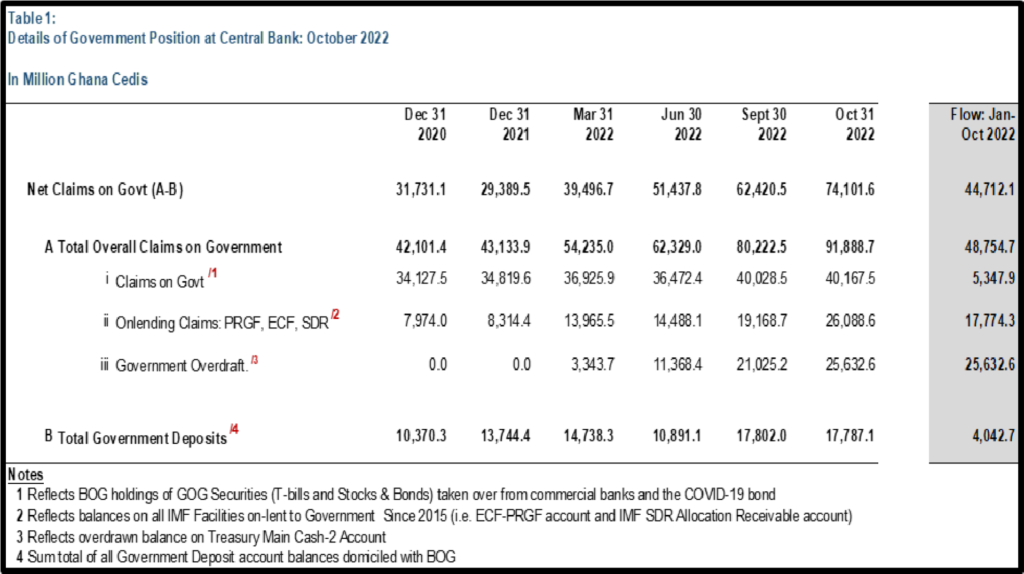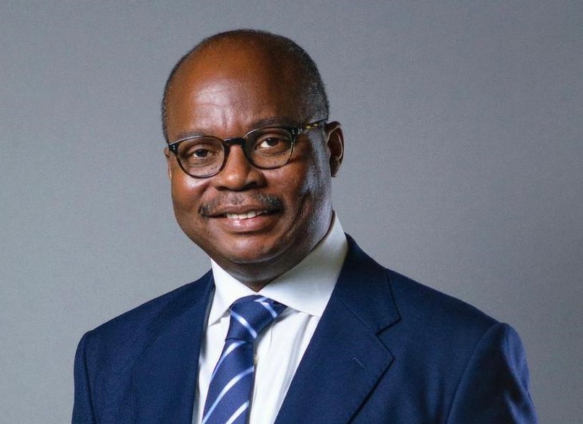The Bank of Ghana (BoG) has described as false and unfounded some allegations made by Member of Parliament for Bolgatanga Central, Isaac Adongo.
According to the Central Bank, “the allegations are aimed at impugning the hard-won credibility of the Bank of Ghana and its management”.
“The Bank of Ghana’s attention has been drawn to a press engagement by the Member of Parliament for Bolgatanga Central, Isaac Adongo, on 8th November 2022 during which he provided some false data and made unfounded allegations,” a statement from the BoG said.
The statement recounted that the MP alleged that the Bank of Ghana had “illegally” financed government to the tune of ¢70 billion or more since 2021. This response is to present the facts.

The Facts
1. The table below provides key highlights that explains the evolution of Government Accounts at the Bank of Ghana. In addition to the table, we have also provided clear explanations of the key components making up the Bank of Ghana’s total overall claims on government.
A (i) Claims on Government
The claims on government represent the stock of debt held by the Bank of Ghana and reflect accumulated claims for over twenty years, including legacy assets such as the Telecom Malaysia Bonds issued in relation to the privatization of Ghana Telecom and Tema Oil Refinery Bonds.
At the end of December 2020, the claims on government stock position stood at ¢34.1 billion and includes the ¢10 billion Covid-19 bond purchased by the Bank of Ghana. It would be recalled that in 2020, a request was made by the government, through the Minister of Finance, to suspend the Fiscal Responsibility Act due to the Covid-19 pandemic. This was approved by Parliament together with the trigger of Section 30 of the Bank of Ghana Act, 2002 (Act 612) as amended, and paved the way for the government to issue a Covid-19 Bond which was purchased by the Bank of Ghana at the policy rate, with moratorium of two years.
At the end of December 2021, claims on government rose to ¢34.8 billion, and have recently risen further to ¢40.2 billion at the end of October 2022, reflecting an increase of ¢5.3 billion in 2022, which was the result of pre-mature unwinding of positions held by some banks.
A (ii) On-lending Claims: PRGF, ECF, SDR
On lending claims are facilities granted by the international Monetary Fund (IMF) for onward lending to Government by the Bank of Ghana.
IMF instruments and resources have been redesigned to provide budget support rather than balance of payments support, including recent resources from the ECF programme with Ghana and the RCF that was provided during the Covid-19 pandemic, and are therefore on-lent to the Government. These are denominated in US dollars and revalued in line with exchange rate changes. From the table, these claims have increased by an amount of ¢17.8 billion from beginning of the year to October 2022.
This reflects a revaluation of these claims in the Bank of Ghana’s books to account for exchange rate developments. This figure does not reflect Bank of Ghana’s lending to Government but rather resources from the IMF that were required to be passed on to Government in line with approvals by the IMF Board. And the increase in the amount in 2022 does not reflect new cash transactions but rather merely a book-entry figure, driven in large part, by the depreciation of the currency.
A (iii) Government Overdraft
Government overdraft is a short-term bridge financing to the budget. The devastating after-effects of the pandemic worsened the fiscal position in 2021, as government struggled to meet revenue targets to help with budget implementation. Even though there were intermittent short-term liquidity extension by the Bank of Ghana consistent with the law to enable the government fund its expenditures, the government fully paid back its indebtedness to the Bank of Ghana by the end of 2021. This is evidenced by the zero overdraft position at the end of December 31, 2021 in the table above.
In the first quarter of 2022, Ghana’s credit rating was downgraded and effectively shut out of the International Capital Markets. Consequently, there were no inflows from external sources to support budget implementation and the government started experiencing unsuccessful auctions on weekly basis.
In the process, the Bank of Ghana had to step in and provide financing to keep government machinery running, and in particular, help prevent a domestic debt default situation. This activity is clearly shown in the overdraft line in the table, which stood at ¢25.6 billion as at October 2022.
"This support is temporary and consistent with crisis management as we work with the International Monetary Fund to design a debt operation that will lift the burden of debt servicing off the budget. The Central Bank has been transparent on these issues as spelt out in the September 2022 MPC Press release".
Bank of Ghana’s Swaps, Repurchase Agreements and Sale Buy Back
Instruments
Last but not the least, Mr. Adongo also raised the issue that the Bank of Ghana has illegally borrowed $7 billion through bridge financing, swaps, repurchase agreements etc. and therefore seeking funds to refinance this amount.
Swaps, repurchase agreements and sale buy back transactions, the BoG, said, are legitimate operations conducted by all Central Banks for effective foreign exchange reserves management. The Bank of Ghana it stressed has deployed these instruments since 2011 for foreign exchange liquidity management purposes. It is an important instrument for foreign exchange management by all central banks, as part of its treasury and reserve management functions.
The global developments have resulted in tight financing conditions and these swaps have served as a significant source of foreign exchange liquidity for the economy.
Furthermore, the Central Bank said the total outstanding Swaps, Repurchase Agreements and sale and buy back transactions stood at $2.4 billion at end October 2022, of which only $720 million is expected to mature by the close of the year.
"We wish to assure the public that the Bank of Ghana is a reputable institution, which is professional with high standards. We have been recognised and awarded internationally on this score and all operations and policy decisions of the Bank are conducted with a high sense of duty and integrity to the best interest of the economy", it added.
Latest Stories
-
Actress Benyiwaa of ‘Efiewura’ TV Series is dead
1 minute -
Ashanti Regional Chief Imam dies at age 74
26 minutes -
Africa Arts Network calls for tax reform to save Ghana’s theatre industry
38 minutes -
SSTN Ghana Chapter reaffirms commitment to economic growth under new leadership
45 minutes -
Inlaks strengthens leadership team with key appointments to drive growth across sub-Saharan Africa
2 hours -
Green Financing: What Ghana’s Eco-startups need to know
2 hours -
CHAN Qualifiers: Amoah confident of beating Nigeria
2 hours -
Governments deprioritising health spending – WHO
2 hours -
Lordina Foundation brings Christmas joy to orphans
2 hours -
Yvonne Chaka Chaka to headline ‘The African Festival’ this December
2 hours -
Nigerian man promised pardon after 10 years on death row for stealing hens
2 hours -
MGA Foundation deepens support for Potter’s Village
2 hours -
Galamsey: One dead, 3 injured as pit collapses at Nkonteng
3 hours -
Man, 54, charged for beating wife to death with iron rod
3 hours -
MedDropBox donates to UG Medical Centre
3 hours

